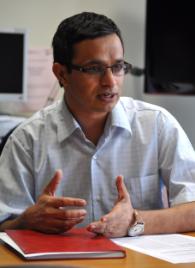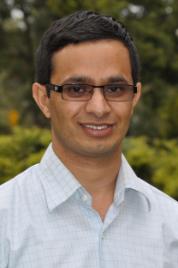Carbon rich forests focus of UN plans - study reveals bigger picture
Published on 16 June, 2011
A CQUniversity researcher has spent the past two and half years investigating ways to reduce carbon emissions to positively impact on climate change, while reducing poverty in developing countries...
PhD researcher Thakur Bhattarai has been looking into the impact of carbon trading on developing countries and hopes to convince governments on policies that will maintain the integrity of forests and improve the well-being of forest communities.

Researcher Thakur Bhattarai"It has been widely accepted that the emission from deforestation and forest degradation from the developing countries is contributing about one fifth of global emissions, more than the entire transportation sector, and if we do not stop the deforestation and forest degradation, most of the world's forests and important ecosystems will have disappeared by the end of 2100," Mr Bhattarai said.
"We need to stop these communities from mortgaging the forests for immediate gain and get them to think about the future, offering economic incentives as an alternative to support their life."
Mr Bhattarai believes a new United Nations backed climate policy has the potential to reclaim the forests and compensate the communities for their lost income which had been generated from the forests.
A policy titled Reduced Emission from Deforestation and Forest Degradation (REDD) and the role of conservation, sustainable management of forests and forest carbon enhancement (REDD Plus) is currently being considered by the United Nations Framework Convention on Climate Change (UNFCCC).
"REDD plus is a UN initiative to create a financial value for the carbon stored in forests, offering incentives for developing countries to reduce emissions. This mechanism of flow of funds from developed to developing countries has been attracting substantial global attention as it may potentially contribute not only to climate change mitigation by reducing greenhouse gas emissions, but also reward the indigenous and local communities in developing countries to improve their livelihoods."
Though REDD plus is still in piloting and negotiation phase, it is likely to be included in the Post-Kyoto period after 2012.
Mr Bhattarai's research suggests this policy will have huge benefits.
 "One hectare of community managed forest can sequester nearly 7.5 tonnes of carbondioxide equivalent and that can, at least, double their net annual income which can be used not only to enhance forest carbon but most importantly, to improve the livelihood of the poor."
"One hectare of community managed forest can sequester nearly 7.5 tonnes of carbondioxide equivalent and that can, at least, double their net annual income which can be used not only to enhance forest carbon but most importantly, to improve the livelihood of the poor."
However, there are still concerns that the financial benefits won't reach the forest communities.
"There is a lot of concern that the livelihood of forest dependent poor communities in countries like Nepal (where much of Bhattarai's research has been conducted) will be adversely affected by such a policy if governments don't hand on the benefits of the arrangement.
Thakur has not only explored the likely impacts from the mechanism but also proposed a governance and benefit distribution system from which poor, marginalised indigenous and local communities will greatly be benefited.

